Last week’s vote by a divided Richmond City Council to kill the arena-anchored Navy Hill project marked an end to a years-long, multimillion-dollar effort that had become the signature economic development priority for Mayor Levar Stoney’s administration.
The vote also raised a lot of questions – about the fate of the project area and the city-owned land within it, what’s to come of a major employer that planned to fill one of its buildings with thousands of new jobs, and what, if anything, the project’s failure conveys to those who may be considering doing business in the city.
Three days after the vote, Stoney sat down with Richmond BizSense to ponder those questions, provide answers to some, and reflect on what happened – and what still needs to happen – post-Navy Hill. Below is an edited transcript:
Richmond BizSense: What went wrong? How did Navy Hill not come together the way you were hoping?
Levar Stoney: I think we, as an administration, truly gave it the college try. This is roughly 2 1/2 years of work that we put into this, from the construction of the request for proposals, to the review of the project, to the negotiation of the project, down to introduction back in August.
Since August, we’ve been even more diligent in sitting down, trying to listen to the concerns of not only members of the City Council but also of the community. … Once we heard from a number of stakeholders and citizens, we did our best to address their concerns.
… But in order to make something happen in this city you also need a partner across the table, and in this government, it’s the executive branch – this administration – and the legislative branch (City Council). And after a number of attempts, we had some City Council people who just withdrew from the conversation. You can’t really get to a win if the other side is not going to participate in the process.
RBS: There seemed to be a perception that, when you finished the negotiations and formally introduced the ordinances, optically it looked like: Pass off to council, now it’s in their court. Was that the case, or were you still trying to have those conversations?
LS: After we introduced the papers back in August, my role was facilitator, to facilitate the discussion and the conversation: What does the City Council need, what do they want. … But at the end of the day, you need City Council members who actually articulate what their problems and their concerns are, because if we don’t hear what your concerns are, you’re unable to articulate them, then how do we know how to address them?
Our job was to play the middle man between the developer (NH District Corp.) and (council), and NHDC went directly to members of the council as well and tried to have these conversations. Some were productive and some were not. …
RBS: Would you have done anything differently? Some council members were saying they felt like they weren’t involved as early as they could have been, for example.
LS: When we say that we were facilitating these discussions, they have been involved from the beginning. When I was constructing the vision for the RFP, I sat down with all nine members and said, “This is on my agenda, this is the first large economic development project I’m going to move forward with, what are your thoughts?” Some people said we should have homeownership in the project plan. We listened to the people who brought that. And then some people, they did what they did in the 11th hour as well, and that was to push away from the table.
RBS: So how do you move forward? The council majority asked for some specific steps to “reset” the process. Do you plan to work with them on those?
LS: I’m always willing to listen to (council’s) ideas. But I also need a commitment from City Council to act in good faith if we’re going to do large-scale, ambitious projects like this.
I’m always thinking about moving (forward)… so I’m brushing myself off, getting back at it, because there are a number of people in this city who are dependent upon us to provide opportunities for them.
RBS: Should the city be doing large-scale, ambitious projects? Should they be broken up, as some council members suggested?
LS: I don’t think you stay competitive with simply and only incremental steps. I think you’ve got to have a bold vision to take the city to the next level, because guess what, there are other cities up and down the East Coast, in the Mid-Atlantic and in the South, who are doing these sized projects. … I’m thinking about tomorrow, and how do we insulate ourselves through a recession, and how do we compete on another plane in the future.
Although this town is booming – you see cranes in the sky here and downtown, you see them in Manchester and Scott’s Addition – this part of downtown is growing at an anemic 2 percent. And today, after that vote on Monday, there are still non-tax-generating parcels of land that could be used to create new revenue and new opportunities for all Richmonders. And we missed that opportunity.
RBS: When you’re talking about competing with other cities, are you concerned about what message this process put out there?
LS: That’s always been my fear, that this would send a chilling message to investors, to the business community, to developers, that this is not a place that they should spend their time or their money. How do you ignore what happened?
The business community wants certainty. They want the ability for us to hear them out, for us to do our job and due diligence. We did that, this administration did that. But there’s also an expectation that they’re going to get a fair say in the City Council chambers as well, and what this showed was, at the 11th hour, we could potentially pull the rug out underneath everything. Forget your process that you laid out for the public, forget all of that.
To think that those in New York aren’t watching this, those in the Washington metro area aren’t watching what’s going on here, folks across this country are, it does send a chilling message.
RBS: Is there also a concern of some damage control needing to be done with the local business community that was offering this project in the first place?
LS: I will say this: I’m going to do everything in my power to retain the roughly 1,000 jobs we have at CoStar, and to speak to (CEO) Andy Florance and say Richmond has to still be an option. I want those 2,000 jobs. Navy Hill would have been a special place for them, but it’s my job, it’s my responsibility, to go to the mat and see if we can get those 2,000 jobs located right here in the city.
RBS: But the opportunity that brought on that CoStar opportunity – a private investment of $900 million from Tom Farrell and company – is that something that can be salvaged in some way?
LS: I will try my best to convince them that this is a great place for investment. But I think they’re going to require what I require in my position, and that is a council that’s going to act in good faith.
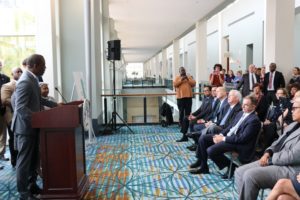
Stoney in 2018 announcing his support for the project in front of NH District Corp. members (seated from right) Tom Farrell, C.T. Hill and others. (BizSense file)
RBS: There’s a process underway that could culminate later this year in an RFP for the Boulevard-Diamond site. Is that going to be your priority now? Is there concern of that distracting from Navy Hill?
LS: Navy Hill and the property along Arthur Ashe Boulevard are both tremendous opportunities for economic empowerment in this city. What happened on Monday, I think, destabilizes both projects. We have a process we’re going to fulfill for the properties on Arthur Ashe, because I think they could be a boon for the city, but we don’t want the same result that came to the end of Navy Hill to come (for the Boulevard site). That’s the fear. You still need seven (council) votes.
RBS: It’s been suggested this project was maybe too complex or too big for Richmond, that it was maybe too major-league of an idea for a minor-league town. What is your take on that?
LS: This might be the personality conflict that I have with maybe some members of the City Council, is that I think for far too long we’ve sold ourselves short here in the city. If you have a minor-league mentality, then you’re going to be minor league, and I think that the bar should be high for this city.
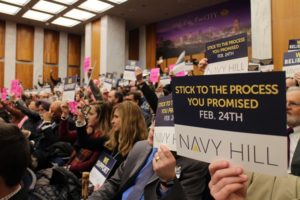
Attendees at last week’s public hearing raised signs for and against the project ahead of council’s vote. (BizSense file)
If they think that what happened on Monday night is going to diminish my belief and love in this city, wrong. I’m going to continue to swing for the fences. Why? Because these are the sort of projects that do close the gap in the city between the haves and the have-nots, and doing nothing, simply the status quo, basically is us giving approval to where things are today.
RBS: It seemed like this project hit a brick wall in the form of the history of this city and everything that came before: racial divide and controversial past economic development projects. How do you help the city get past that?
LS: My message to residents is to not despair over this, because we will continue to advance the ball towards more equity and more opportunity for people across this city. That’s our commitment.
Currently, Navy Hill is dead, but we still have a responsibility to provide opportunity, and we’re going to obviously work on the blocking and tackling, the basic services that our taxpayers paid for. We’re going to continue to ensure that they get the best services in the city, but also, we have to be committed to economic empowerment. It doesn’t change anything. It doesn’t change the fact that there’s a hole in the middle of downtown Richmond right now.
Last week’s vote by a divided Richmond City Council to kill the arena-anchored Navy Hill project marked an end to a years-long, multimillion-dollar effort that had become the signature economic development priority for Mayor Levar Stoney’s administration.
The vote also raised a lot of questions – about the fate of the project area and the city-owned land within it, what’s to come of a major employer that planned to fill one of its buildings with thousands of new jobs, and what, if anything, the project’s failure conveys to those who may be considering doing business in the city.
Three days after the vote, Stoney sat down with Richmond BizSense to ponder those questions, provide answers to some, and reflect on what happened – and what still needs to happen – post-Navy Hill. Below is an edited transcript:
Richmond BizSense: What went wrong? How did Navy Hill not come together the way you were hoping?
Levar Stoney: I think we, as an administration, truly gave it the college try. This is roughly 2 1/2 years of work that we put into this, from the construction of the request for proposals, to the review of the project, to the negotiation of the project, down to introduction back in August.
Since August, we’ve been even more diligent in sitting down, trying to listen to the concerns of not only members of the City Council but also of the community. … Once we heard from a number of stakeholders and citizens, we did our best to address their concerns.
… But in order to make something happen in this city you also need a partner across the table, and in this government, it’s the executive branch – this administration – and the legislative branch (City Council). And after a number of attempts, we had some City Council people who just withdrew from the conversation. You can’t really get to a win if the other side is not going to participate in the process.
RBS: There seemed to be a perception that, when you finished the negotiations and formally introduced the ordinances, optically it looked like: Pass off to council, now it’s in their court. Was that the case, or were you still trying to have those conversations?
LS: After we introduced the papers back in August, my role was facilitator, to facilitate the discussion and the conversation: What does the City Council need, what do they want. … But at the end of the day, you need City Council members who actually articulate what their problems and their concerns are, because if we don’t hear what your concerns are, you’re unable to articulate them, then how do we know how to address them?
Our job was to play the middle man between the developer (NH District Corp.) and (council), and NHDC went directly to members of the council as well and tried to have these conversations. Some were productive and some were not. …
RBS: Would you have done anything differently? Some council members were saying they felt like they weren’t involved as early as they could have been, for example.
LS: When we say that we were facilitating these discussions, they have been involved from the beginning. When I was constructing the vision for the RFP, I sat down with all nine members and said, “This is on my agenda, this is the first large economic development project I’m going to move forward with, what are your thoughts?” Some people said we should have homeownership in the project plan. We listened to the people who brought that. And then some people, they did what they did in the 11th hour as well, and that was to push away from the table.
RBS: So how do you move forward? The council majority asked for some specific steps to “reset” the process. Do you plan to work with them on those?
LS: I’m always willing to listen to (council’s) ideas. But I also need a commitment from City Council to act in good faith if we’re going to do large-scale, ambitious projects like this.
I’m always thinking about moving (forward)… so I’m brushing myself off, getting back at it, because there are a number of people in this city who are dependent upon us to provide opportunities for them.
RBS: Should the city be doing large-scale, ambitious projects? Should they be broken up, as some council members suggested?
LS: I don’t think you stay competitive with simply and only incremental steps. I think you’ve got to have a bold vision to take the city to the next level, because guess what, there are other cities up and down the East Coast, in the Mid-Atlantic and in the South, who are doing these sized projects. … I’m thinking about tomorrow, and how do we insulate ourselves through a recession, and how do we compete on another plane in the future.
Although this town is booming – you see cranes in the sky here and downtown, you see them in Manchester and Scott’s Addition – this part of downtown is growing at an anemic 2 percent. And today, after that vote on Monday, there are still non-tax-generating parcels of land that could be used to create new revenue and new opportunities for all Richmonders. And we missed that opportunity.
RBS: When you’re talking about competing with other cities, are you concerned about what message this process put out there?
LS: That’s always been my fear, that this would send a chilling message to investors, to the business community, to developers, that this is not a place that they should spend their time or their money. How do you ignore what happened?
The business community wants certainty. They want the ability for us to hear them out, for us to do our job and due diligence. We did that, this administration did that. But there’s also an expectation that they’re going to get a fair say in the City Council chambers as well, and what this showed was, at the 11th hour, we could potentially pull the rug out underneath everything. Forget your process that you laid out for the public, forget all of that.
To think that those in New York aren’t watching this, those in the Washington metro area aren’t watching what’s going on here, folks across this country are, it does send a chilling message.
RBS: Is there also a concern of some damage control needing to be done with the local business community that was offering this project in the first place?
LS: I will say this: I’m going to do everything in my power to retain the roughly 1,000 jobs we have at CoStar, and to speak to (CEO) Andy Florance and say Richmond has to still be an option. I want those 2,000 jobs. Navy Hill would have been a special place for them, but it’s my job, it’s my responsibility, to go to the mat and see if we can get those 2,000 jobs located right here in the city.
RBS: But the opportunity that brought on that CoStar opportunity – a private investment of $900 million from Tom Farrell and company – is that something that can be salvaged in some way?
LS: I will try my best to convince them that this is a great place for investment. But I think they’re going to require what I require in my position, and that is a council that’s going to act in good faith.

Stoney in 2018 announcing his support for the project in front of NH District Corp. members (seated from right) Tom Farrell, C.T. Hill and others. (BizSense file)
RBS: There’s a process underway that could culminate later this year in an RFP for the Boulevard-Diamond site. Is that going to be your priority now? Is there concern of that distracting from Navy Hill?
LS: Navy Hill and the property along Arthur Ashe Boulevard are both tremendous opportunities for economic empowerment in this city. What happened on Monday, I think, destabilizes both projects. We have a process we’re going to fulfill for the properties on Arthur Ashe, because I think they could be a boon for the city, but we don’t want the same result that came to the end of Navy Hill to come (for the Boulevard site). That’s the fear. You still need seven (council) votes.
RBS: It’s been suggested this project was maybe too complex or too big for Richmond, that it was maybe too major-league of an idea for a minor-league town. What is your take on that?
LS: This might be the personality conflict that I have with maybe some members of the City Council, is that I think for far too long we’ve sold ourselves short here in the city. If you have a minor-league mentality, then you’re going to be minor league, and I think that the bar should be high for this city.

Attendees at last week’s public hearing raised signs for and against the project ahead of council’s vote. (BizSense file)
If they think that what happened on Monday night is going to diminish my belief and love in this city, wrong. I’m going to continue to swing for the fences. Why? Because these are the sort of projects that do close the gap in the city between the haves and the have-nots, and doing nothing, simply the status quo, basically is us giving approval to where things are today.
RBS: It seemed like this project hit a brick wall in the form of the history of this city and everything that came before: racial divide and controversial past economic development projects. How do you help the city get past that?
LS: My message to residents is to not despair over this, because we will continue to advance the ball towards more equity and more opportunity for people across this city. That’s our commitment.
Currently, Navy Hill is dead, but we still have a responsibility to provide opportunity, and we’re going to obviously work on the blocking and tackling, the basic services that our taxpayers paid for. We’re going to continue to ensure that they get the best services in the city, but also, we have to be committed to economic empowerment. It doesn’t change anything. It doesn’t change the fact that there’s a hole in the middle of downtown Richmond right now.

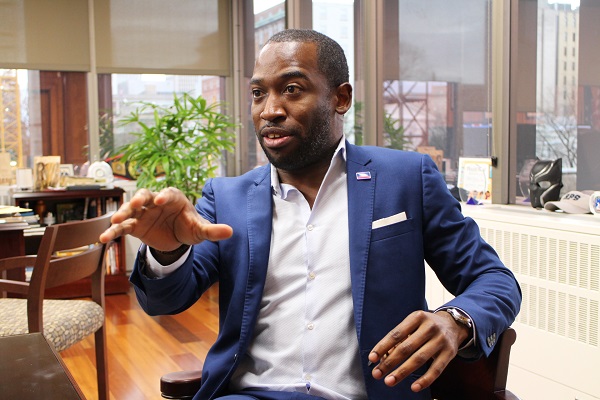
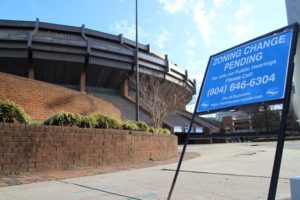
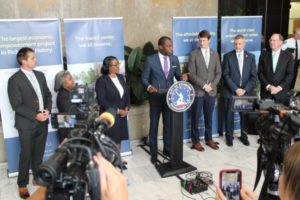
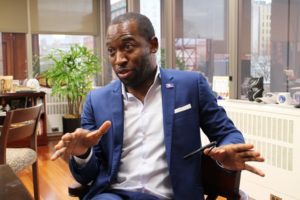


Thanks for this article Richmond Bizsense. Mayor Stoney did a great job summing up the challenges he faced with City Council and I’d encourage him to continue swinging for the fences.
This feels a lot like Amazon bailing out of Queens, NY for HQ2. Some folks may consider it a win keeping developers from lining their pockets, but Richmond spited itself to do that. Rising tides floats all boats Richmond.
Amazon didn’t bail out of Queens. The HQ2 was a promise to bring “x number of jobs” over “y number of years.” Although they aren’t building “HQ2,” that’s pure optics – they’ve already brought new jobs to NYC and are on schedule with the the HQ2 jobs promise. You took a weird lesson from that. Virginia gave up millions and could get less jobs over the decade than Amazon first proposed if anything goes wrong for Amazon as a corporation – NYC rejected giving Amazon money, and they’re getting the jobs anyway. Amazon is going to go where they have… Read more »
“I think you’ve got to have a bold vision to take the city to the next level, because guess what, there are other cities up and down the East Coast, in the Mid-Atlantic and in the South, who are doing these sized projects. … ” Name a few then rather than just talk in platitudes Stoney… Cities *our size* who have built an urban entertainment based amenity like an arena with no major league sports tenants. That aren’t having their surrounding counties chip and pay for it as a region. And the project has generated tax revenue that is actually… Read more »
To play Devil’s Advocate, I think Allentown PA and their PPL center/ City Center development is often cited as an example of a comparable project in a comparable city. It’s a smaller city/metro and has seen quite a bit of success with their TIF/NIZ-based project. It’s completely transformed that city’s downtown area.
https://www.citycenterallentown.com/
That’s not to say that Allentown’s story has been a perfect success (and is necessarily 100% analogous to the Navy Hill proposal) but it’s a lot closer than trying to compare RVA to anything in DC.
“Don’t bring up Nats Park!” When in fact, it’s not a terrible comparison (although not my first choice) when you factor in the capacities of the entertainment complex and hosted events, to the surrounding population and residences. Yet here you are with your lame Kansas City Power & Light District argument. Let’s see… Did you ever mention that is was opened in 2007, just before one of our countries worst recessions? Nope, of course not. Did you mention the sales figures from 2008-2014 more than doubled as the economy got back on track? Did you mention it took until 2015… Read more »
Over two years of negotiations and yet the financial projections were still constantly changing – over 20 times – a moving target no council member could ever make an informed decision on as long as it was alive. What a teetering house of cards with very poor and unconvincing arguments about how Navy Hill can’t have office buildings, residential, and hotel developments without a publicly-financed arena. I don’t really care what other cities are or are not doing. In Richmond, development decisions using taxpayer funded and publicly-owned land will no longer be dictated by the rich and well-connected. My mayor… Read more »
They weren’t changing it because they were intentionally trying to confuse people, just the opposite. They were trying to respond to concerns raised by the public and by council. You can’t have it both ways, you can’t complain when they propose something and at the same time complain when they attempt to address them bc they are “changing” it. Absurd.
They were primarily changing financial assumptions because numerous ordinary citizens, on their own free time, were pointing out the serious discrepancies in the ridiculous assumptions (on incorrect tax collection assumptions, on lofty building assessments, on lack of incorporating city services costs, on and on and on).
If you believe Navy Hill was making these changes to ‘address concerns’ and were trying to make the proposal better, I have a bridge to sell you.
In her previous arguments she said to not compare us to DC and other places bc they were too big, but then wants to compare us to KC and Detroit which are also much larger metro areas to Richmond. Her argument does not hold water. If you can use “bad” examples from larger communities then “good” examples should also be allowed to be used.
You could have shared that additional information without being an ass. Based on your additional information, the OP just posted part of the story, yet none of it was inaccurate. Is that correct?
A wise man once said: “Oh the arguments are boring when they…..”. Never mind.
Columbus, OH Arena District is a very similar, successful comparison.
Columbus has 879,000 plus city residents and a metro area of 2 million. Yeah not similar. Oh and read the Columbus paper. July Headline reads “Public funding for new Crew stadium now up to $140 million, and land not yet acquired” They are having financing issues and they have not even started building the stadium. Someone please send me a successful one anywhere. PLEASE!!! Read up on “successful” Columbus https://www.dispatch.com/news/20200213/email-ties-crew-stadium-land-to-nationwide-loan-restructuring
Norfolk/VA Beach is similar to RVA. Look at HRs 2017 arena deal. It worked out so well. https://www.wavy.com/news/local-news/virginia-beach/va-supreme-court-agrees-to-hear-appeal-over-virginia-beach-arena-lawsuit/
I need to read further into the details but I am curious as to why they would be building an additional stadium if the first deal was not successful? The area certainly looks like it greatly improved regardless.
Interesting articles for the last 6 months on how City’s costs have doubled beyond what was promised, how the new soccer stadium may not be built unless more is public financed as cost overruns are eating into initial bonds, and that the affordable housing promises were taken out of final deal. Quote from Columbus Dispatch In December: The Dispatch reported in October that, after Mayor Andrew J. Ginther repeatedly stated new affordable housing units were a highlight of the project, the city quietly negotiated that requirement out of the contract with the team, leaving only a “best effort” provision. Negotiations… Read more »
The main reason “this part of downtown is growing at an anemic 2 percent” is that commercial tax assessments for office building owned by Dominion ($55 million assessment for last 10 years) and Riverstone have not increased in the last 10 years and in the case of the James Center, have decreased over the last 5 years despite record leasing and building renovations. Look at the tax assessment history for 701 E Cary Street and 901 E Cary St.
That is a good point. With exception of the tax-exempt properties, it looks like most of the office developments are losing improvement value faster than they are gaining land value. I would expect the JC renovations to increase it but I supposed they have a ways to go yet (and maybe receiving a tax-break?). Do individual property vacancy rates have any affect on assessing improvements? Once 700 E Canal comes down that will eliminate $45 mil. in improvements.
No mention of the election? Stephanie Lynch ran on on a platform that included a clear guaranteed No vote on Navy Hill, and defeated challengers who offered yes and maybe votes. The electorate had their say and they said no. Before the election it wasn’t clear if the proposal could get through city council or not, afterwards it had no chance. I’m pretty surprised to see a 1500 word interview with the mayor and neither party mentions the election or his constituents.
The election of one council member doesn’t mean anything.
If the council wanted they could have put it for a vote in November and the people really could have chosen.
why should 2,004 people in the 5th district (a mere only 27% of 5th district voters) determine the outcome of this massive project? the fifth district had a say, and it isn’t clear that the majority of 5th district voters were in favor of killing navy hill.
5th District residents really didn’t. It was a resounding ‘no’ vote across the city, considering three council members would have had to change their vote to ‘yes’ to get this to pass. Navy Hill was nowhere close to getting passed.
So you think a Lynch win equates to the entire district wanting a “NO” result? I see you conveniently forget to mention that she only received 28% of the vote. Wouldn’t that mean that 72% favored a “Yes” or a “Maybe” candidate? While I don’t discount the possibility that there could be a significant number of people who don’t want the stadium to equate a 28% vote to a “clear” result for a no on the project is disingenuous at best.
I live in the 5th district and I voted for Stephanie Lynch. My vote matters! It is more significant than what is said by the 50 pro NH people who hang out on this forum 24 hours a day. Go have a good cry with Thad and Chuck in the sore losers club.
The big-picture problem is that the City of Richmond somehow needs to expand its tax base in order to prosper in the long-term. I don’t know if the Navy Hill project would have been the best solution, but I applaud Mayor Stoney for trying. Expanding the base of taxable property in Richmond is harder to do than it is elsewhere because 1) the city cannot expand its boundaries thanks to post-1970 constitutional changes, and 2) so much of the real estate in the downtown core is not taxed because it is owned by the state. More regional cooperation would be… Read more »
I’m confused on CoStar, what is delaying them from acquiring land and building an office in Richmond?
Is Richmond out of available real estate? Their comments don’t pass the smell test as to why they aren’t building.
Is it purely a lack of minor league hockey that is causing them to pause expanding their corporate office?
Most companies are not interested in being their own landlord and there is no current spec builds to fit them (current Manchester plans are too small). NH would have been that opportunity. Perhaps a developer will pop up that would build a significant facility with them signed on as a tenant.
With as much complaining and carrot dangling as Co Star has been doing, it certainly seems like the demand is there for someone to build a building having CoStar as a tenant.
Unless they were just an active pawn in the whole Navy Hill optics play.
It can take awhile to put together a site large enough for the size building they want, but my guess is New Market with all their land there might be able to carve some more off for them, but that will be a pretty penny. Maybe it is time to revive the old millennial towers project. lol
It is surprising that anyone would care what Mayor Stoney thinks. His handling of the project was detrimental to its success at every step. It should have been a still birth. That it stayed alive as long as it did is a credit to the Mayor spending an incredible amount of treasure and talent on pretending it was viable. He excluded Council for far too long ,and his offer to compromise came well after the project/s doom was evident to the realistic. He cannot ask Council to share the blame for the NH defeat. A mayor who ignores his government… Read more »